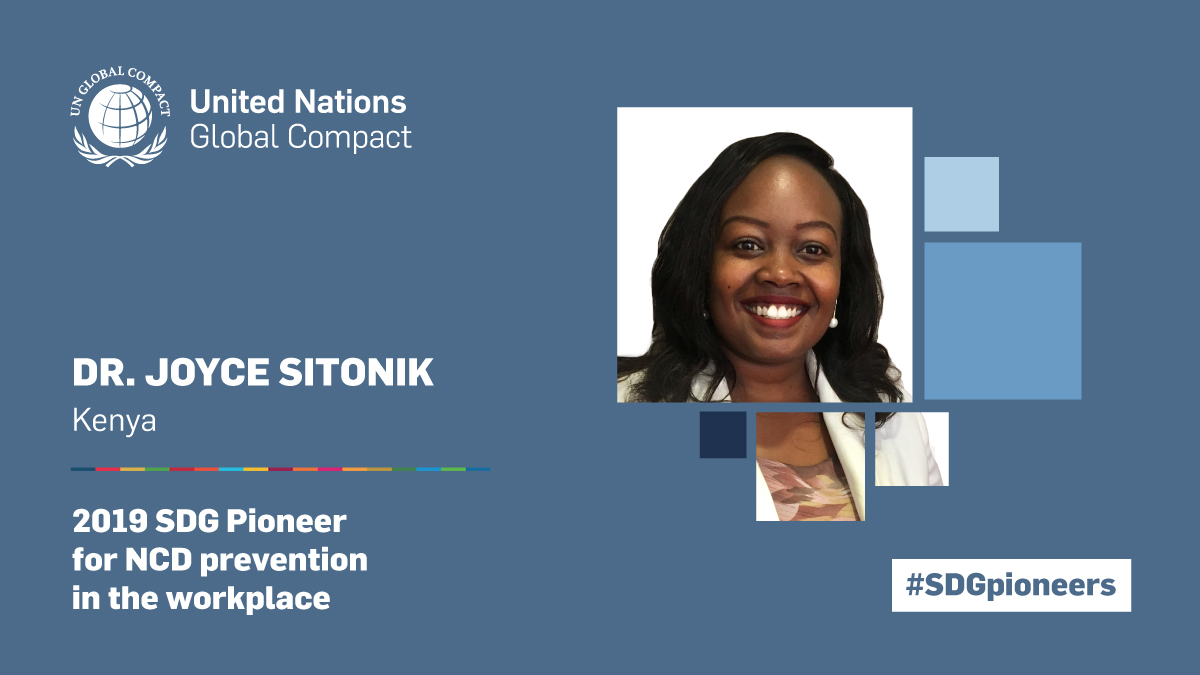An SDG Pioneer for NCD prevention in the workplace

Dr. Joyce Sitonik has filled her medical toolkit with doses of prevention and treatment — along with the advancement of well-being and mental health —
to keep East Africans healthy and happy.
As Head of Clinic Business Operations at AAR Healthcare (Kenya) Ltd., Dr. Sitonik has helped develop corporate wellness packages that tackle local and global health risks, including non-communicable diseases (NCDs) and mental health issues. The wellness packages also advance Sustainable Development Goal 3 (Good Health and Well-Being) as they enhance the business values and objectives of the company, a subsidiary of AAR Healthcare Holdings Limited. The parent company touches the lives of 650,000 people in East Africa every year.
Dr. Sitonik saw the opportunity for AAR to use its existing technical capacity, brand name and track record to deliver effective management of health risks as a product. Dr. Sitonik mapped out a clear process: linking specific interventions for high-risk health cases with the subsequent monitoring, by so-called “wellness champions”, of patients’ responses to the interventions. Dr. Sitonik receives monthly reports from these “wellness champions” on more than 1,000 high-risk patients under their care.
AAR is actively helping Kenya move toward health target 3.4 of Goal 3: a one-third reduction of premature deaths from NCDs through prevention and treatment and the promotion of mental health and well-being. The number of people screened for NCDs has increased sixfold, from about 1,000 in 2016 to more than 6,000 in 2018. Clinicians identified more than 100 people with high risk for cancer and more than 500 new cases of high blood pressure. The wellness packages also added business value by boosting revenues at AAR.
Dr. Sitonik has gathered support among internal and external stakeholders: the medical team now promotes wellness check-ups to their patients at all contact points and marketing/public relations teams find the programme enhances its image as a one-stop-shop. Shareholders experience value as the programme improves the company’s Return on Investment. External stakeholders, such as employers, medical insurance providers and other partners, find value in a well-structured wellness programme.
AAR upholds many of the Ten Principles through the wellness programme. Principles 1 and 2 on human rights, for example, are met by carrying out the wellness checks in high confidentiality even when sponsored by employers. The employee retains the primary right to their test results and the right to decide who has access. This action protects participants from discrimination based on health-related factors and adheres to Principle 6 on labour.
AAR’s medical waste management protocol is highly controlled, even for workplace-based screening programmes. It adheres to Principle 8 on the environment by following hazardous waste disposal regulations when segregating and disposing of waste. Guided by the anti-corruption directive of Principle 10, AAR Healthcare submits bids for wellness programs and wins them through its technical capacity, its record of accomplishments and other qualities. The company does not pay bribes to win bids and has a functioning internal whistleblower mechanism.
AAR Healthcare has been a participant of the United Nations Global Compact since 2008 and is an active member of the board of Global Compact Network Kenya. Dr. Sitonik regularly attends meetings to share useful insights. The health care company has also successfully persuaded many other local organizations to join Network Kenya.
Joyce is 34 years of age.
